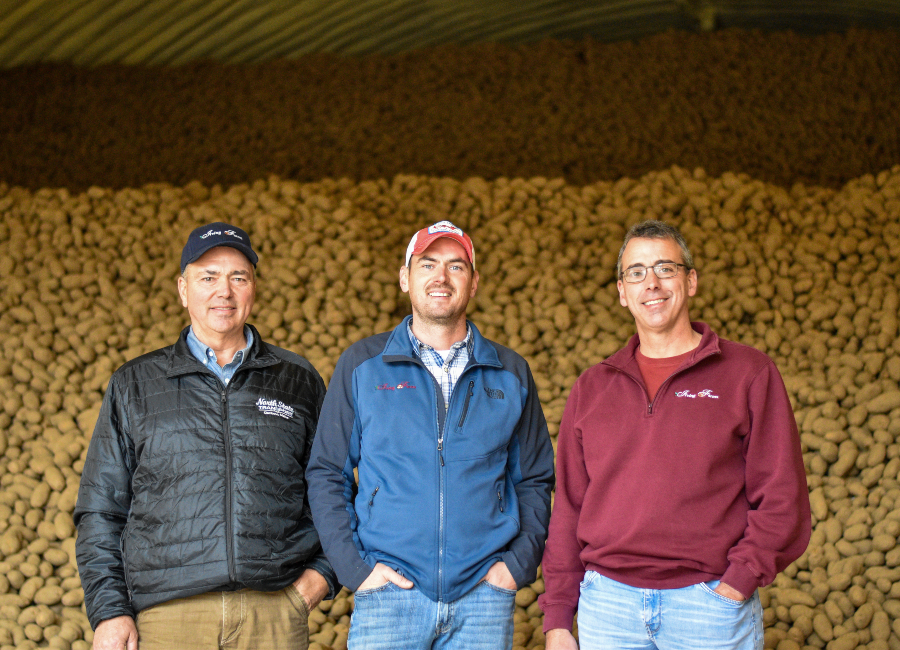
The Caribou Crew: Irving Farms gaining notoriety for up-and-coming variety
The Irving family has been growing potatoes in Aroostook County, Maine, since the early part of the 19th century. The Irvings are well-known for their quality spuds, but these days they’re becoming known for a specific up-and-coming variety — the Caribou russet.
Robbie Irving, a sixth-generation member of the family to farm, shared an example of that reputation gaining legs.
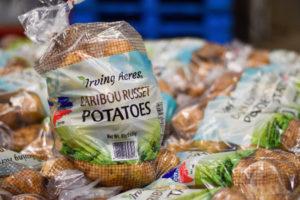
“I was able to go to Potato Expo earlier this year, and Colin Szawlowski (of SWAZ Potato Farms in Massachusetts) was introducing me to some guys,” Irving said. “They said, ‘Oh, you’re the Caribou guy.’”
Caribou, of course, is the name of a small town in Maine not far from the Canadian border, which happens to be home base for Irving Farms. It’s also the name chosen for a russet variety developed by University of Maine potato breeding program that’s fast gaining a reputation for its consistent uniformity and strong culinary qualities.
Caribou russets also has been marketed as Maine-grown potatoes both on packaging for retail and on restaurant menus. Irving Farms, which has its own marketing division led by Jeff Irving — Robbie’s uncle — has been at the forefront of that effort. The operation, which also is a prominent packer-shipper with 15 trucks in their fleet, has “Caribou russet” or “Maine Potatoes” imprinted on its packaging and boxing. The team also works with customers — whether foodservice or retailers — to encourage that the branding be displayed prominently.
“The Caribou russet has really opened up marketing to the foodservice industry,” Robbie Irving said. “We mostly sell to the commercial grocery stores, but now we’re starting to get into foodservice. It’s a winner.
“They’re using it for french fries (and) baked potatoes. We’re selling 80 counts mostly (to foodservice). We’ve had great reception and feedback.”

The farming portion of the operation, led by Robbie and Scott Irving — another uncle — grew Caribous on nearly half of the 920 acres they grew spuds in 2019. They also grow reds and yellows for tablestock and Burbanks for the processing market. McCain Foods and Penobscot McCrum have processing plants in Aroostook County.
“We grow Superiors for the early white market, as well as a late variety which is a Harley Blackwell,” Robbie said. “We’re growing Dark Red Norlands and Keuka Golds for the red and yellow markets. For the other table russets, we’re growing Norkotahs and Goldrush.
“We’re trying to hit all the markets.”
Irving Farms’ fresh-processing ratio is 80-20, with the majority going to the fresh market. Their acres grow potatoes every third year, typically, with rotational crops including winter rye, oats, barley and a clover mix. Also, they collaborate with Smith Farms on acreage that includes a broccoli rotation.
Meeting challenges
Aroostook County, home to farms aplenty, accounts for nearly 22% of Maine’s land acreage, but just 5% of the state’s population. Like farmers in many rural regions of the U.S. can relate to, finding enough manpower during peak seasons, like harvest and the winter packing, is a struggle.
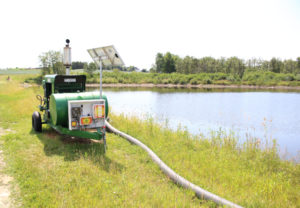
“Labor,” Robbie Irving said without hesitation when asked about the farm’s biggest challenge. He said automation in packing is something they’re eyeing to alleviate the problem.
“We need to get up to speed on automation,” Irving said. “I was fortunate enough to be part of the PILI (Potato Industry Leadership Institute) in 2015 and went out to Washington to see some of the operations there. Like Easterday Farms, their level of automation was amazing.”
One area Irving Farms is ahead of the curve is irrigation. Robbie spoke of changing weather patterns in the region in recent years, which have resulted in extremely dry summer months. Fortunately for Irving Farms, there is an infrastructure in place from when Bob Irving ran the operation.
“My grandfather built pond after pond after pond,” Robbie said.
The need for irrigation water continues to grow, however. Although there are numerous manmade ponds on the Irvings’ property, they added another in 2019 — their first since 2004. They also have access to a 115-acre lake — fittingly called Caribou Lake.
Access to water is necessary, but so is getting it to the fields, and that’s where the Irvings have made significant upgrades in recent years. They include underground piping, which alleviates the need to “lay pipe every day all summer,” as well as an automated irrigation system that allows pumps to be controlled remotely. Irving Farms owns nine center pivots, seven of which were in use in 2019.
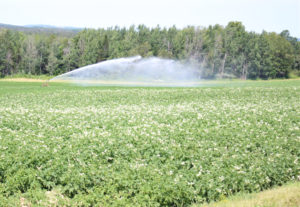
Irving Farms opted for Irrigation Automation Systems, a Massachusetts-based company, for their system. They began using IAS’s XR-3000 in 2018. It monitors field temperature, water pressure and oil pressure to maximize efficiency. For an operation like Irving Farms, which has plots of land spread out across the region, helps eliminate a lot of headaches. Robbie and Scott control the pumps manually through a smartphone or computer, and can set a temperature threshold to turn on automatically.
“In the pre-automation era, you’d probably have a small army of guys in pickup trucks at 2 a.m. (monitoring the temperature and pumps),” said Paul Oparowski of IAS, who worked with Robbie to set up the system. “There is a temp radio that monitors conditions. The grower will have a threshold set and when it reached that, it connects to the engine and sends an alert to your phone.
“For growers that have fields many miles or even hours apart, that’s a big labor saver and a safety feature. If say a wheel falls off your pivot, you’re able to shut it off even when you don’t have the ability to get up there quickly.”
PHOTO GALLERY: More images from Irving Farms
Robbie said the farm’s irrigation infrastructure gets attention from neighboring growers.
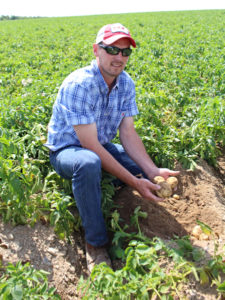
“When we get all those pivots going, I tend to get a lot of text messages,” Irving said, with a chuckle. “It’s funny, I’m working the same land my dad (Steve, now retired) worked and his dad worked, but only I’m doing it using GPS.”
In addition to the irrigation system, Irving Farms is in the process of adding a 110-by-140-foot supplemental storage shed, which they hoped would be ready to store spuds this fall.
Although relatively young to be co-owner of a farming operation, Robbie Irving — who won the Maine Potato Board’s 2014 Young Farmer of the Year award — hasn’t been shy about getting involved beyond his own acres. He’s a current state potato board member and a National Potato Council voting delegate.
The Irvings are proud of their product and their family’s extensive farming history, but also of their close relationship with their fellow Maine potato growers. Robbie said that’s common in agriculture, however.
“Farmers go above and beyond to help each other,” he said.
Top photo: From left, Scott Irving, Robbie Irving and Jeff Irving. Photo by Jessica McNamara, Irving Farms







